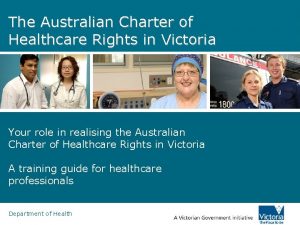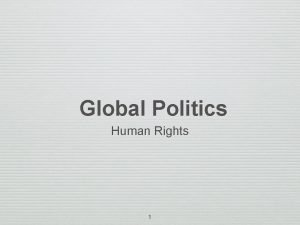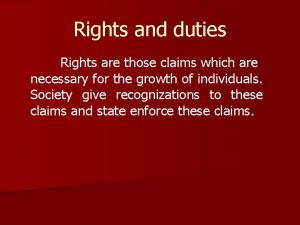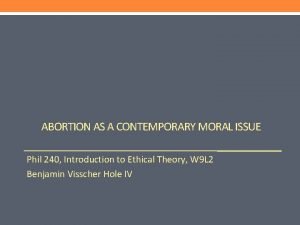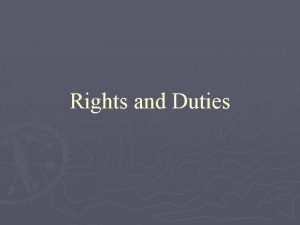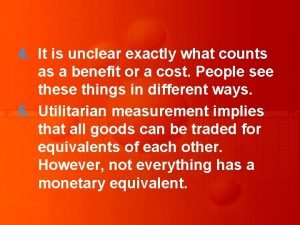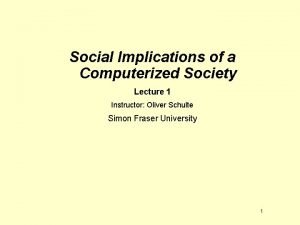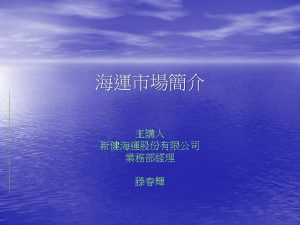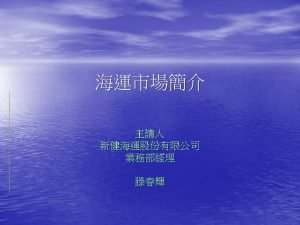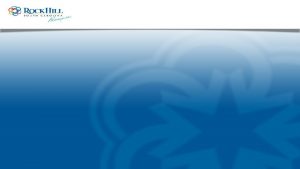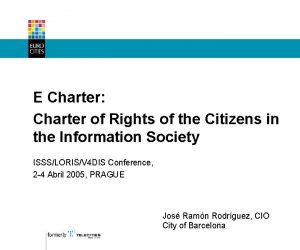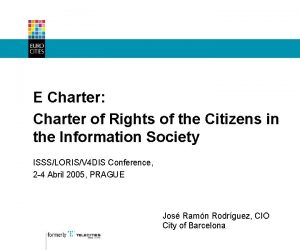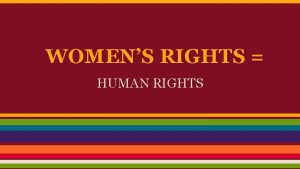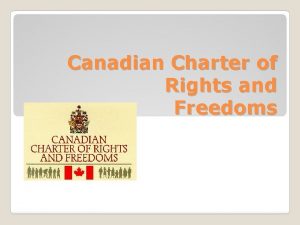The Charter of Rights 1 Overview of Charter








- Slides: 8

The Charter of Rights 1. Overview of Charter 2. Charter Activities

The Charter of Rights and Freedoms � On April 17, 1982, in front of the parliament buildings in Ottawa, Prime Minister Pierre Elliott Trudeau and Queen Elizabeth II signed the document which would bring home Canada's constitution. A part of the new Constitution Act, 1982 was the Canadian Charter of Rights and Freedoms. For the first time in our history, Canadians could look to a document which would outline what rights and freedoms they enjoyed. � The Charter protects our rights and freedoms by placing limits on the ability of the government to pass laws or take any actions that may infringe on our rights. All people in Canada must be treated equally regardless of their race, religion, sex, or age. The

Charter Activities �In pairs or individually complete the following activities using “The Charter of Rights and Freedoms” handout located in the Student Common Folder. �This handout can be somewhat difficult to understand, use the additional handout supplied by Ms. Thompson to help simplify The Charter of Rights and Freedoms. �We will be taking up your answers at the end of class so be prepared to defend your responses.

You will need to refer to your Charter of Rights and Freedoms handout to complete this part of the activity. a. Jennifer Adams, a law abiding Canadian citizen, decides to go on a trip to China. When she arrives at the airport, she is told that she is not allowed to leave Canada. No reason is given by the authorities. Charter Section: Violation: b. Stephen Harper decides that he wants to be Prime Minister for life and refuses to call an election. Charter Section: Violation: c. The government decides that all churches are to be closed down permanently. Charter Section: Violation: d. A recent immigrant who speaks little English is very confused at his criminal trial because he does not understand what is being said. Charter Section: Violation: e. You are arrested and thrown in jail. You are not told what the charges are for two weeks. With no reason given, you are denied bail for a minor shoplifting offence. Finally, after one year in prison, you get your day in court. Unfortunately, you are defending yourself because you are unable to pay for a lawyer. Charter Sections:

Now that you have become familiar with the different rights and freedoms found in the Charter, which two do you consider to be the most important? Briefly explain your selections. a. b. Sometimes situations arise when one right or freedom may be in conflict with another. Often when this happens we look to the courts to resolve the conflict. You are to read two scenarios where there is a conflict of rights. Your task will be to read each one and decide whose right is to be upheld. One is called The Locker Search and the other Prohibiting Kirpans.

Scenario: The Locker Search Facts: Rajiv was offended by Harvey's "paki" jokes and claimed Harvey was a racist. Later, a fight developed after Harvey told another joke and called Rajiv a "dumb raghead". Rajiv punched Harvey three times, hard. The fight was broken up by teachers and both boys were suspended for three days. Harvey's father met with the principal and complained that he was afraid for his son's life - noting that Rajiv wore a kirpan. Students at the school were choosing sides, based partly on skin color. The principal responded to the increasing tensions at school by searching student lockers where she suspected there might be weapons, alcohol, or drugs. Under the province's Education Act, the principal has a legal duty to maintain order and discipline in the school. Suppose one of the students whose locker was searched complained that the locker search was against the law. Issue: whether or not the locker search was justifiable in these circumstances. Decision: (with reasons):

Scenario: Prohibiting Kirpans Facts: Rajiv was offended by Harvey's "paki" jokes and claimed Harvey was a racist. Later, a fight developed after Harvey told another joke and called Rajiv a "dumb raghead". Rajiv punched Harvey three times, hard. The fight was broken up by teachers and both boys were suspended for three days. Harvey's father met with the principal and complained that he was afraid for his son's life - noting that Rajiv wore a kirpan. Students at the school were choosing sides, based partly on skin color. The principal phoned Rajiv's home and told his parents that he could not come back to school wearing his kirpan. She told them she was relying on a government regulation which allows school officials to prohibit students from wearing kirpans on school grounds. Suppose Rajiv's parents think the principal's order is against the law. Issue: whether or not the government regulation unjustifiably interferes with Rajiv's fundamental freedom to practice the Sikh religion.

Extra Task: Create Your Own Charter �Choose a social group that you feel needs human rights protection. Create a charter of rights and freedoms for your chosen group, addressing that group’s particular concerns and needs. �List your chosen group’s grievances, followed by a list of the rights that might resolve those grievances.


